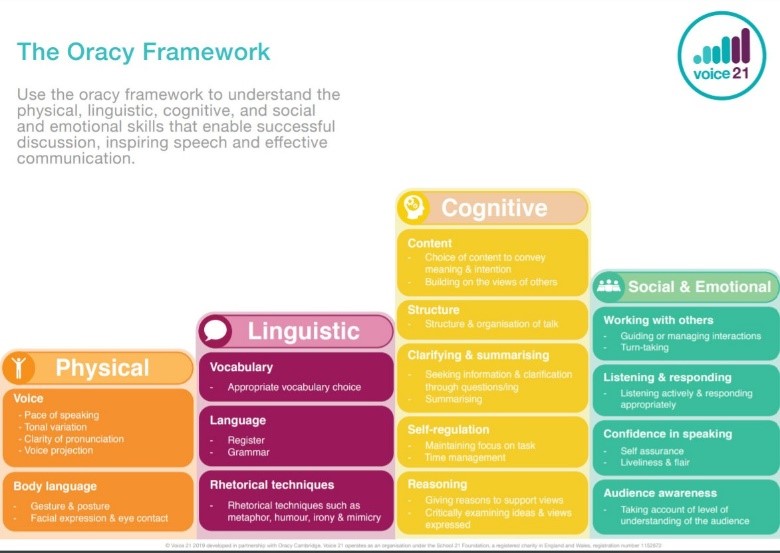Welcome to Wildridings Primary School!
Oracy
At Wildridings Primary School, we recognise that the ability to communicate effectively is essential for learning and for success in life. Oracy, the development of speaking and listening skills, is an integral part of our curriculum. Through our partnership with Voice 21, we are committed to ensuring that every child is given the opportunity to develop their oracy skills and use talk as a powerful tool for learning.
What Can High-Quality Oracy Education Achieve?
Research and evidence, including studies from the Education Endowment Foundation (EEF), demonstrate that high-quality oracy education leads to a range of positive outcomes for children:
-
Improved Academic Outcomes:
- Structured talk helps children to think critically, reason together, and express their ideas clearly. This not only enhances understanding in English, Maths, and Science, but also supports learning in other areas of the curriculum. By developing vocabulary and the ability to discuss concepts, students can articulate their knowledge more effectively.
-
Enhanced Literacy Development:
- The EEF literacy reports show that structured classroom talk can improve literacy outcomes, particularly for disadvantaged pupils. Developing oracy skills is directly linked to improvements in reading, writing, and comprehension.
-
Increased Confidence and Wellbeing:
- Oracy education empowers students by helping them believe that their voice has value. Through debate, discussion, and collaborative talk, children develop the confidence to express their thoughts and ideas, fostering a sense of belonging and self-worth.
-
Life Skills for Future Success:
- Strong communication skills are crucial for success in education, employment, and civic life. Employers consistently highlight the importance of communication in their hiring practices. By building effective oracy skills, children are better equipped to engage with their communities, access opportunities, and thrive in the workplace.
-
Closing the Gap for Disadvantaged Learners:
- Oracy education helps narrow the language gap between disadvantaged and more advantaged pupils. By explicitly teaching communication strategies and providing opportunities for all children to speak and listen, we enable every child to reach their full potential.
Teaching Oracy at Wildridings
At Wildridings, we have adopted the Voice 21 Oracy Framework to support our teaching. This framework provides a structured approach to developing oracy across the curriculum.
-
Early Years Focus: In the EYFS, we place a strong emphasis on developing the social, emotional, and physical aspects of communication. We encourage exploratory talk, where children can use language to express ideas, solve problems, and engage with their peers.
-
Oracy in the Classroom: In Key Stage 1 and Key Stage 2, teachers create regular opportunities for pupils to engage in purposeful talk across all subjects. Sentence stems are used to scaffold conversations, encouraging children to articulate their thoughts clearly and respectfully. These sentence stems can also be used at home to support discussions and reinforce learning.
-
Across the Curriculum: Oracy is embedded throughout the curriculum, with structured discussions and debates in subjects such as History, Geography, and Science. Children learn to listen actively, build on each other’s ideas, and engage in collaborative problem-solving.
Voice 21 Resources
We are working closely with Voice 21, a national organisation dedicated to improving oracy in schools. Their framework helps us to develop and implement oracy teaching strategies that can have a lasting impact on our students' academic and personal growth.

For more information on how Voice 21 supports oracy development, visit their website:
Voice 21
By prioritising oracy at Wildridings, we are empowering our pupils to speak with confidence, listen with respect, and engage in thoughtful discussions. This approach not only supports academic success but also prepares our children for a future in which their voices are heard, valued, and impactful.
